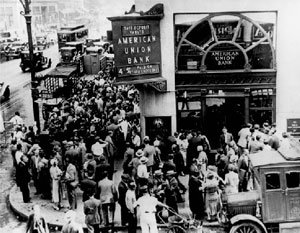Tyler Cowen asked today, “We’re the bailouts a good idea?” He then proceeds to answer his question in the affirmative.
Here is his logic:
If another big negative shock comes the government’s liability position still could turn out to be much worse. But if we stop and click pause and evaluate the policy today — the answer to my question is “yes, the bailouts were a good idea.”
Without the bailouts we would have had many more failed banks, very strong deflationary pressures, a stronger seize-up in credit markets than what we had, and a climate of sheer political and economic panic, leading to greater pressures for bad state interventions than what we now see. Milton Friedman understood all this quite well, which is why argued bailouts would have been a good idea in the 1929-1931 period.
 There is more to his post, so please read it and note that he worries about disastrous long-term consequences. With good reason, I might add. But I have a little problem with the way the whole debate is framed.
There is more to his post, so please read it and note that he worries about disastrous long-term consequences. With good reason, I might add. But I have a little problem with the way the whole debate is framed.
It seems as if the only choices being considered are no action or the type of action that was taken by the Treasury and the Fed. This suggests that the manner in which the bailouts were constructed matters little at all. I think that much of the antipathy that has arisen with respect to the interventions comes not so much from the fact they occurred but from the structure that was employed.
Though it looks for the moment at least to have been a good bet, the all in bet on the part of the government without a commensurate amount of potential sacrifice on the part of the private debt and equity owners of the banks was a major flaw. Barring a cataclysmic failure all were effectively insulated from catastrophic loss by the Treasury. For this they have perhaps paid a price in current market valuations but in relation to the assistance that was proffered it is a minuscule price.
The decision to pretend that all banks were equally at risk of failure and thus had to participate in the TARP program was a poorly conceived concept that negated the value the market might bring to the process in sorting the wheat from the chaff. It has become rather clear since that fateful Sunday that there are quality differences among the banks as evidenced by their ability to unwind the government assistance. Still, I would contend that investors now view them now more as a group that has unrestricted access to the government’s pocketbook as opposed to evaluating each on its merits.
Had the debt and equity holders suffered some of the first loss or been put in jeopardy of such a loss and had the Fed and Treasury been more discriminate in their choice of who to assist then we might well have a situation today in which market forces are helping to rein in the excesses of the banks instead of cheering their return to business as usual.
Traumatized pension funds, insurance companies and other institutional investors might well be making it abundantly clear to bank CEO’s that having dodged the bullet once, they would no longer abide risk taking of the type previously practiced. The market might well be judging and rewarding firms for strategies that reduce risk and decrease leverage instead of calculating how quickly EPS numbers can get back to normal. In effect, the government might have some powerful allies in its quest to tone down the industry’s business practices.
So, yes, all things considered the bailout was a good idea. That doesn’t mean we couldn’t have been smarter about how it was constructed. That was the criticism at the time and just because it seems to have worked doesn’t mean that it isn’t a valid criticism nor does it mean that the architects of the bailout aren’t open to criticism.
- Bulenox: Get 45% to 91% OFF ... Use Discount Code: UNO
- Risk Our Money Not Yours | Get 50% to 90% OFF ... Use Discount Code: MMBVBKSM
Disclaimer: This page contains affiliate links. If you choose to make a purchase after clicking a link, we may receive a commission at no additional cost to you. Thank you for your support!


Leave a Reply